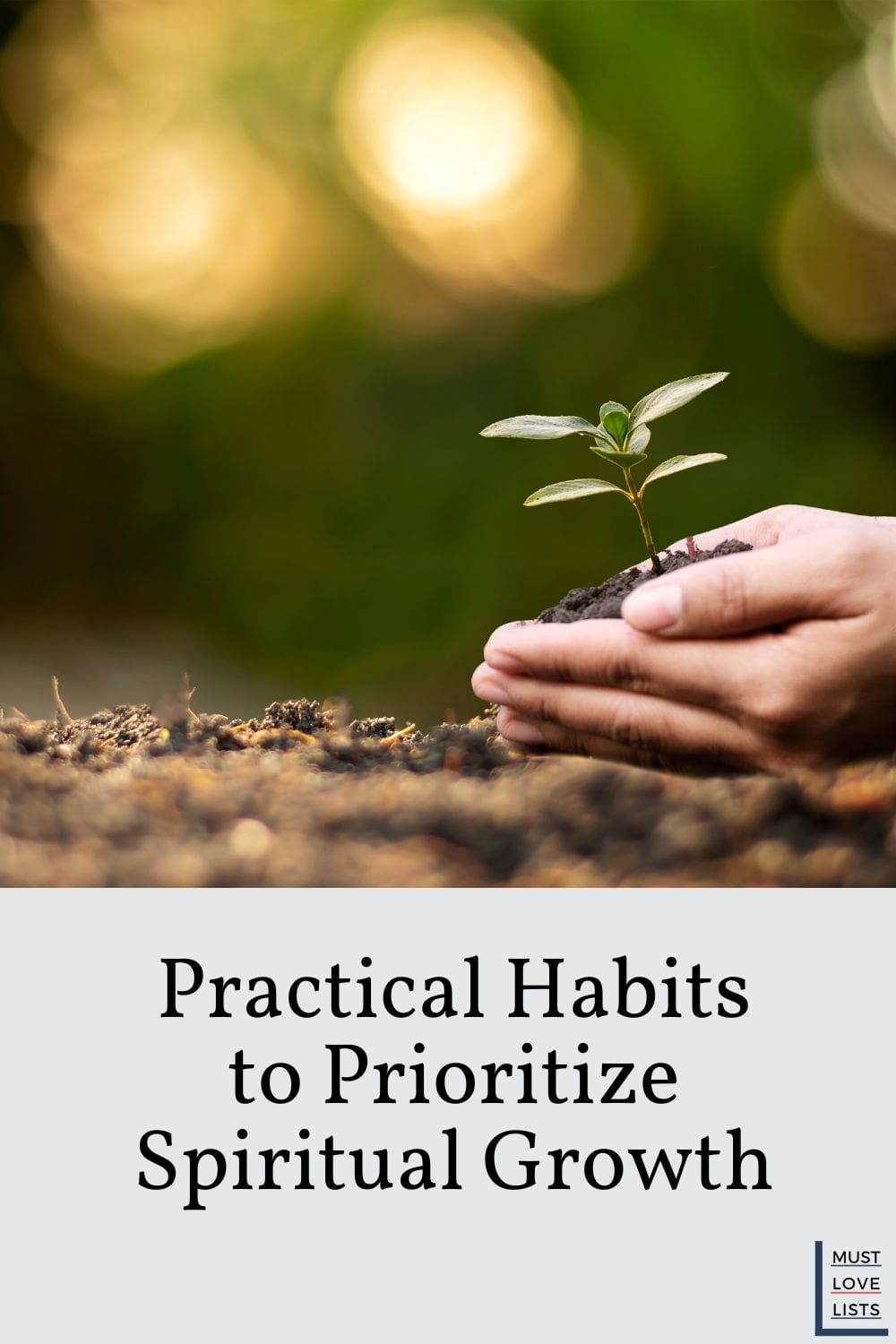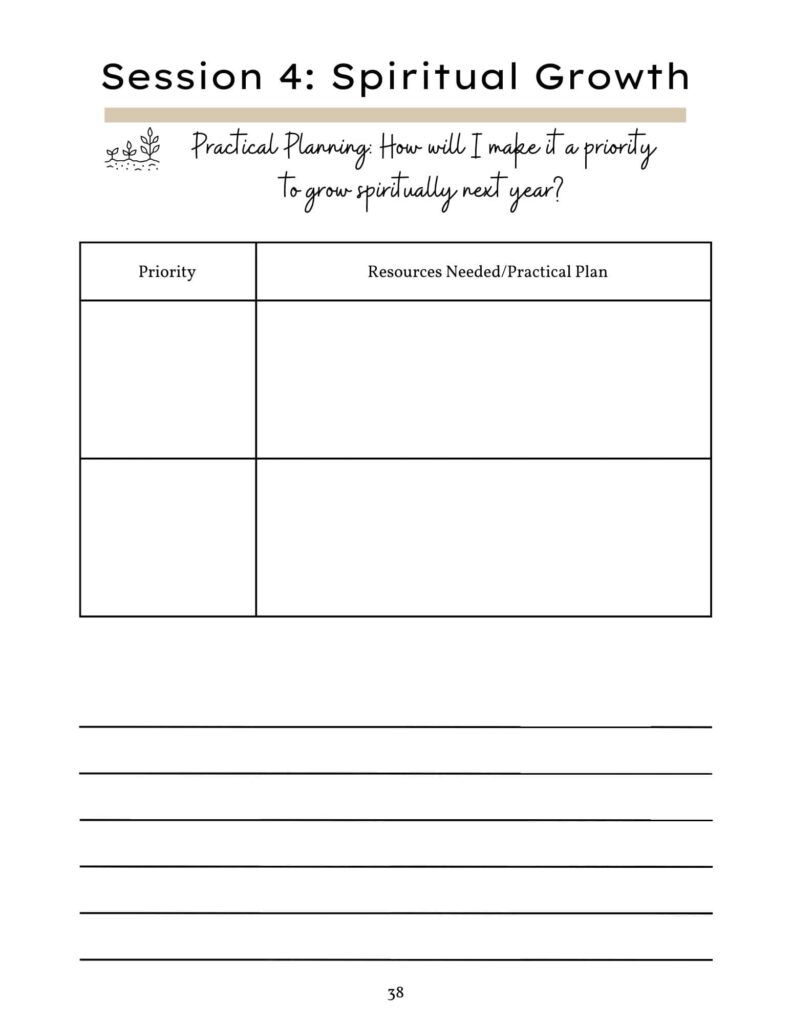Suggestions for Discipline in Spiritual Growth
Spiritual growth can be a nebulous term that is thrown around in sermons or Bible studies. In simplest terms, spiritual growth is the process of becoming more like Jesus. That’s what we’re growing toward, and most often, it’s a slow process. Our spiritual growth doesn’t just happen while we sleep and go about our busy, distracted lives, though. It takes some intentional effort on our part.
I want to share some practical ideas to make it a priority to grow in Christlikeness. The Bible makes it clear that God cares about the state of our hearts more than anything else. In light of that knowledge, we can reflect on some outward expressions of our inward priorities.


Dependence and Discipline in Spiritual Habits
This is the fourth and final article in a series of articles intended to help you think deeply about spiritual priorities. For an introduction to what God tells us he wants us to prioritize, read “Dependence and Discipline: Setting Spiritual Priorities for a New Year.”
Other Articles in This Series
In this series of articles, we’re talking through three things we see in scripture that God wants us to prioritize.
The first priority comes from what Jesus called the greatest commandment—to love God.
Love the Lord your God with all your heart and with all your soul and with all your mind.
Matthew 22:37
To love God we must know Him, and that means prioritizing reading His word and prayer.
The second priority comes from the emphasis throughout scripture on loving others. John 13:34 tells us to love one another, 1 John 4:8 says that “anyone who does not love does not know God, because God is love,” and we could quote many more Bible verses that address this topic.
We love because he first loved us.
1 John 4:19
The third priority is spiritual growth, our transformation to become more and more like Jesus.
But grow in the grace and knowledge of our Lord and Savior Jesus Christ.
1 Peter 3:18
That’s what we’re going to focus on now—practical ways we can grow in our faith.
Spiritual Reality Check
While Jesus does radically transform lives when someone surrenders to Him for the first time, turning away from rebellion and accepting Jesus as Lord and Savior, that life-change is just the beginning.
The Christian life has been described as “a long obedience in the same direction,” a lifelong journey of sanctification, and as a gradual transformation into Christlikeness.
Words like this—long, lifelong, slow, gradual—should not be misinterpreted to mean that our growth will magically happen without any effort on our part. We don’t earn our salvation, but we do respond to God’s gift of grace with action and attitude change and that takes effort.
…make every effort to add to your faith goodness; and to goodness, knowledge; and to knowledge, self-control; and to self-control, perseverance; and to perseverance, godliness; and to godliness, mutual affection; and to mutual affection, love…
2 Peter 1:5
Make It a Priority to Grow in Faith
If you look back a year, two years, or ten years, do you see spiritual growth in your life? Do you see evidence of the fruit of the spirit? You may experience periods of time that feel stagnant, but if you’re prioritizing the two things we talked about in previous articles—loving God and loving others—you should see a trajectory of growth evidenced by character change.
You can start by considering whether any of the following could be prioritized to deepen your love for God.
- Time spent in nature
- Time spent reading God’s word
- Time spent meditating on God’s word
- Time spent in praise and worship
- Time spent memorizing scripture
- Time spent in prayer
- Time spent remembering the gospel
- Time spent reflecting on the character of God
- Time spent listening to Biblical teaching
- Time spent in conversation with another Christian woman
Ways You Can Prioritize Spiritual Growth
The verse in 2 Peter is an excellent starting point in thinking about how you can grow in Christlikeness. There are several characteristics listed that God wants to grow in us through His Spirit. Faith, goodness, knowledge, self-control, perseverance, godliness, mutual affection, love.
The best way to start is to pray. Ask God to reveal whether some area of your life, thoughts, attitudes, words, behaviors, needs to change. If you can think of multiple areas right away, choose one. Look for scripture verses and passages that speak to this area and surround yourself with those scriptures. Listen to songs that talk about it, post Bible verses in your home and in your car, memorize them.
Read: 30 Days of Praying Scripture
Use my guided workbook to walk through setting spiritual priorities in all three areas—loving God, loving others, and spiritual growth. You’ll find prompts, questions, and practical suggestions to help you determine and implement habits and disciplines that respond to God in faithful obedience.


Fruit of the Spirit
Another list of characteristics to consider is the fruit of the spirit found in Galatians 5.
Are you struggling in any of these areas? If so, try to think of an example of when you notice your lack of love, joy, patience, etc. Then you can find scripture that speaks to this, and brainstorm ways to respond in the specific situations that cause you to feel irritation, discontent, or impatience.
- love
- joy
- peace
- patience
- kindness
- goodness
- faithfulness
- gentleness
- self-control
Fruit of the Spirit Character Lessons
Areas in Need of Spiritual Growth
This is certainly not an exhaustive list, but it may prompt you to begin thinking and praying about where God is challenging you to change or grow. Pray, pray, pray about this. He will answer. It is an indisputable fact that God wants to conform you more and more to the image of Jesus. If you ask Him to show you ways in which He wants to change and grow you, He will.
- boldness in sharing the gospel
- deepening friendships with unbelievers
- deepening friendships with Christian women
- trusting the Lord in a difficult circumstance
- reverence for God
- waiting on the Lord
- guarding your tongue
- diligence, commitment, perseverance
- controlling anger
- being teachable
- humility
- impure thoughts
- anxious thoughts
- setting boundaries
- envy, jealousy, or bitterness
- love of money/overconsumption
- gratitude
- forgiveness
- contentment
- confession of sin, giving up specific sin
- guilt, shame, or regret
- fear
- comparison
- hope
- disappointment/unrealistic expectations
- developing a deeper passion for God’s word
- gossip
- pride or conceit
- legalism
- lying
- busyness/distractions/wasting time (time management)
- speaking up for truth
- believing in the goodness of God
- having an answer for why you believe the Bible
- understanding the Biblical position on current cultural issues
- hurtful criticism of others/tearing down
- identity in Christ
- compassion
- eternal perspective
- heart for missions
- self-centeredness
- silence and solitude
- prayer
- enthusiasm for ministry
- generosity
- hospitality
- cheerfulness
- obedience to God’s commands
- loneliness/isolation
- grumbling or complaining
- wrong ideas about scripture (suffering, God’s wrath, inerrancy of scripture)
- taking thoughts captive
- serving the needy
Make a Practical Plan to Grow Spiritually
Now it’s time to get practical. Write your plan down. Here’s an example of how you can make a specific plan.

You probably looked at the lists above and could see room for growth in many of those areas. Don’t make the mistake of trying to change yourself and “do better” in all these areas. Ask God for His power to work in your heart, for His power to change you, and that you would be surrendered to His will for your life.
Choose one or two priorities that God brings to your mind and write those down. Then, read through the list below for suggestions that may be helpful in creating practical habits to grow in those areas.
- find scripture that speaks to this area—memorize it, put copies where you will see it, set reminders to read it, make sure you are reminding yourself of the truth found in God’s word
- pray about it
- ask someone else to pray for you in this area
- ask someone to hold you accountable in this area (call you out when you’re gossiping, being selfish, harboring bitterness, etc.)
- ask yourself what the source of this struggle is (ask when, where, who questions)
- think about how you can replace a thought, response, or behavior with one that is pleasing to God (rehearse scripture, give thanks, sing a song of praise, take a deep breath, turn on worship music, etc.)
- find resources to grow your knowledge in this area (Bible studies, books, podcasts)
- consider ways to reframe or refocus away from a narrow “here and now” perspective to an eternal perspective

Dependence and Discipline in Spiritual Growth
As we grow in humble dependence on the Lord and recognize our need for Him, our hearts and minds will be changed. That type of daily dependence requires discipline on our part. If we don’t discipline ourselves to spend time listening to God through reading His word and responding to Him in prayer, our spiritual growth in every area will be stunted.
If you haven’t read the previous articles in this series, go read them now and be encouraged to implement practical habits for loving God and loving others.
Create a habit of daily Bible reading and prayer. Turn off distractions and slow down enough to think about what you’re learning about God and respond to Him with praise, gratitude, questions, and requests.
The God we worship created all things, rules all things, and upholds all things. That same God desires a relationship with you. His love for you is deep and wide and high and everlasting. How can we not surrender all?
Visit my homeschool resources page for monthly unit study ideas, projects, and homeschool planning help!













